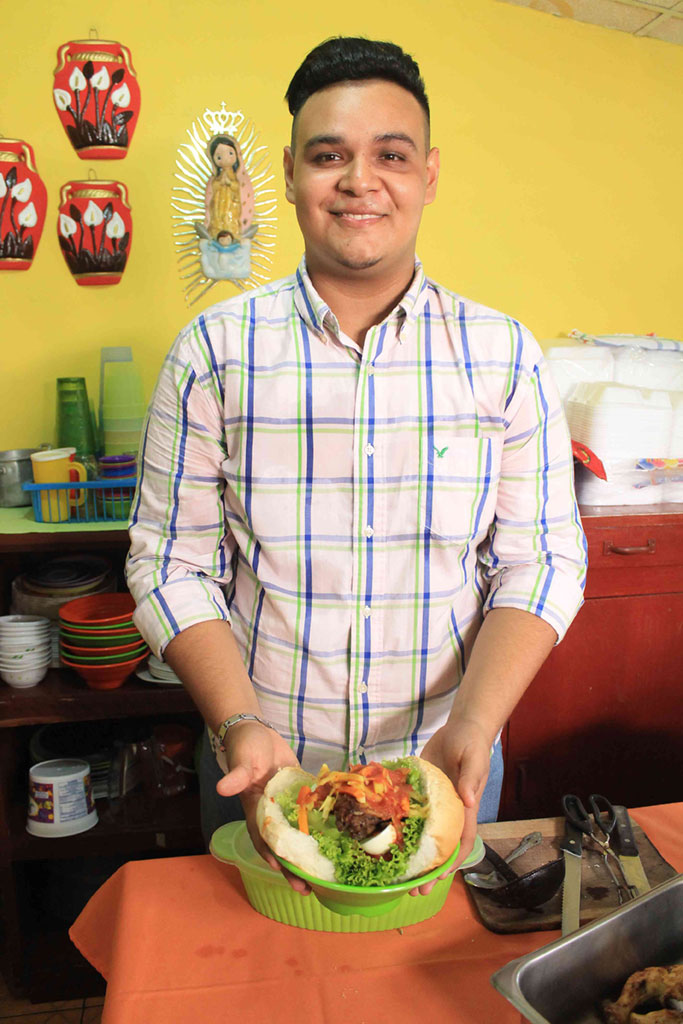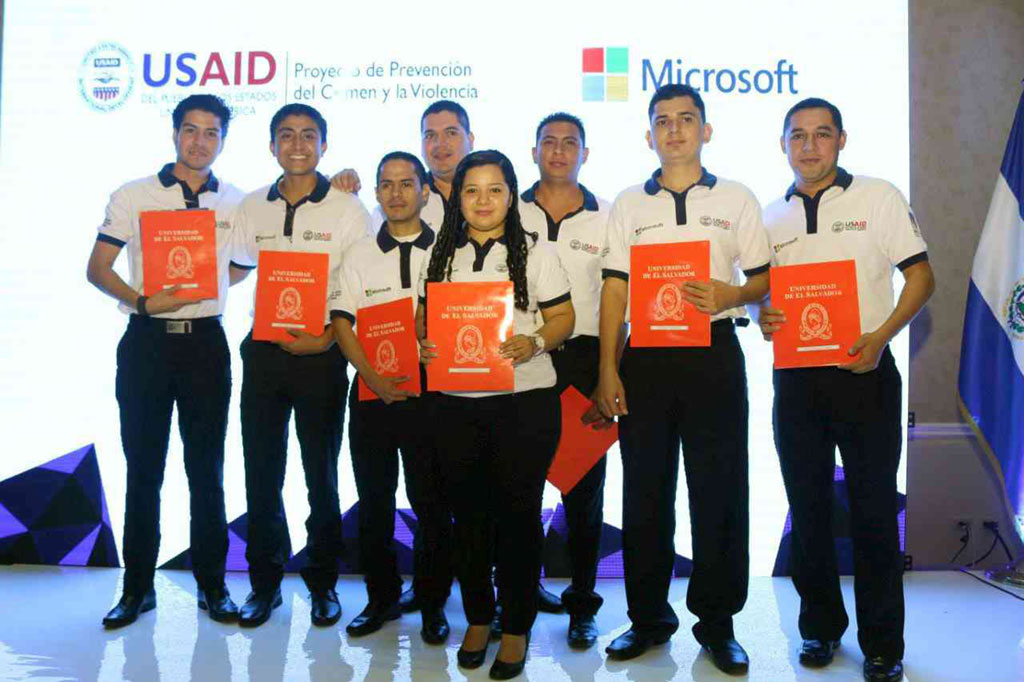Ever Antonio Iraeta Cubias dreamed of becoming a chef and owning a successful restaurant. Like other youth living in the Salvadoran town of San Vicente, dreams more often stay in a young person’s head.
Fortunately, his aunt heard about a vocational education program in San Vicente that included classes on cooking and running a small restaurant. When she asked Iraeta Cubias if he was interested, he responded: “You bet I am!”
He learned how to prepare and serve a variety of dishes. It also built up his confidence. Without the workforce training program, he says, there’s no way he’d be able to make his dream come true.
“The instructor had faith in my ability and explained everything very well,” he says. “It made me feel that I indeed have the capability to manage a business.”
Iraeta Cubias has started his small restaurant, which he called Ana’s Place after his grandmother. Ana’s Place, which was a single-family home turned business, is brightly colored and offers indoor and outdoor seating.
“We focus on family-style cooking, giving the place a homey feeling, so that when people come in they feel like they’re at home,” he says. “I’m cooking, and so is my mom and grandmother.”

Transforming youth from at-risk to employable
Located about one hour from the capital city, San Vicente is like many mid-sized communities in this Central American country. It has a large number of youth and too few employment opportunities—and it is suffering through an epidemic of crime, violence, gangs and drugs.
For many youth in high crime areas of El Salvador, prospects for a better life that is free of gangs and violence are hard to come by when opportunities are scarce. It is difficult to ignore the lure of gangs or the life of easy money in the criminal underworld when there is no option for further schooling or a good job.
Fortunately, the El Salvador Crime and Violence Prevention Project, a five-year, $24 million project implemented by Creative Associates International, is supporting nearly 120 communities throughout this Central American country.
Funded by the U.S. Agency for International Development, the El Salvador Crime and Violence Prevention Project has six primary pillars to its strategy—from supporting communities to develop municipal crime-prevention policies to workforce training for at-risk youth.
Harold Sibaja, Director of the El Salvador Crime and Violence Prevention Project, says low levels of education and too few employment opportunities are the biggest challenges facing El Salvador’s youth.
“I believe that creating employment opportunities is a very strong protection factor for youth in a vulnerable environment,” says Sibaja, who is an expert on at-risk youth.
In cooperation with the mayors, the project created municipal-level Employment Units that specifically worked to train and provide jobs for the vulnerable youth in the communities. In 10 cities, the project created FORMATE vocational education centers that have a well-defined approach to preparing youth for in-demand work.
Gino Wilson López Mendoza of the El Salvador Crime and Violence Prevention Project says the FORMATE vocational education programs are invaluable.
“Before the program, some of the young people would go looking for a job without really knowing what the employer wanted or what type of skills they had or even what job they wanted,” he explains.
The workforce component of the project has reached more than 3,000 youth in 10 municipalities through partnerships with the private sector.
“A country without economic development and jobs would have disastrous consequences,” López Mendoza says. “But, when you offer options to the youth, their vulnerability diminishes, and becoming a member of a gang looks less and less appealing. They can aspire to a better future with many possibilities and job opportunities.”
Nejapa: Creating employment opportunities in a rural community
Nejapa, a community some 30,000 residents that is located about an hour from San Vicente, is well known for its coffee production. Indeed, some 70 percent of the people in Nejapa are dedicated to agriculture.
Unfortunately, this sector does not offer many opportunities for the area’s growing population of youth, which means crime and migration are attractive alternatives for too many of them.
“Nejapa has a very young population and they want to do new things,” says Nejapa Mayor Sergio Quijada. “It is of the highest importance to generate opportunities for young people.”
To address these concerns, Mayor Quijada teamed up with the El Salvador Crime and Violence Prevention Project to conduct surveys to determine the current and future employment needs of local businesses. They also interviewed youth to determine their interests and plans.
“I believe that creating employment opportunities is a very strong protection factor for youth in a vulnerable environment." Harold Sibaja, Director of the El Salvador Crime and Violence Prevention Project
Through the El Salvador Crime and Violence Prevention Project, Nejapa launched its FORMATE vocational education program, which has three career tracks: Residential electric installation; air conditioning installation, maintenance and repair; and international cooking. The classes are offered at no cost to the students.
The curriculum is about 20 percent theory and 80 percent practical training, which is organized in collaboration with the Salvadoran Institute for Professional Training (called the Instituto Salvadoreño de Formación Profesional in Spanish). The Institute provides graduates with recognized diplomas.
The vocational education center provides more than just technical training for these at-risk youth. It prepares them for what to expect when they meet a potential employer for the first time, says Claudia Ramos of the Nejapa Mayor’s office.
“Many times these youth don’t know the process and they don’t know how to dress,” says Ramos. “At time we’ve encountered youth who want to go to the interview in shorts, or t-shirts and without a properly prepared resume, including typos.”
The vocational education center advises the graduates on proper attire for an interview and runs them through practice interview sessions.
Sibaja of the El Salvador Crime and Violence Prevention Project says Nejapa and other communities are seeing results from these efforts—partly because the employment officers are working directly inside the communities that are the most susceptible to crime and violence.
“The mayors are seeing the positive changes in terms of how they’ve been strengthened in working on crime prevention issues,” Sibaja says.
Microsoft Academies provide technical training
In Nejapa and other target cities, students also have the opportunity to obtain an internationally recognized certificate as part of the Microsoft Academy, which is part of the FORMATE vocational education centers.
“We have established an alliance with Microsoft to open Microsoft Academies in these municipalities,” says Sibaja of the El Salvador Crime and Violence Prevention Program. “This is a good opportunity because the Microsoft Academies offer an international certification and to bring that to the municipal level is actually a great opportunity for youth.”
In San Vicente, the city of 53,000 about an hour away from the capital city of San Salvador, Eric Vladimir de la O Torres is the Coordinator of the Microsoft Academy in the FORMATE vocational center.

“The Microsoft Academy is very prestigious for municipality because it doesn’t exist anywhere else” in the area, says Torres.
The academy offers four certifications: Word; Excel; HTML5; and development basics. Each class runs for 15 days, and this location graduated more than 50 students in 2016.
The academy’s coordinator stays with the students even after they complete their coursework by offering ongoing mentorship and guidance.
“We have been very lucky to have the most graduates of all the vocational centers,” the Microsoft Academy coordinator boasts. “Many of the students have gone on to open their own businesses or have used the information they learned to further their own development.”
The Microsoft Academy, combined with other offerings at the vocational center, provide much-needed hope for youth in the area.
“More than anything, these vocational trainings are to give youth the tools they need to grow and get a job, or work for themselves, and get ahead in life,” says Torres. “These are good violence prevention tools because many youth need to be doing something constructive.”
The coordinator explains that the project encourages youth to think about how their lives could be different through vocational education. For example, one group of students is talking about collaborating to open their own business.
“Frankly, if the vocational centers didn’t exist, the best option for these youth is to be in a gang, or just sit around wasting time doing nothing,” Torres says. “I feel very satisfied and happy to see what the young people are doing in the center and what they do when they finish the courses. I’ve run into former students and they tell me ‘thank you’.”
Reported from El Salvador by Michael J. Zamba and Rene Urrutia.
